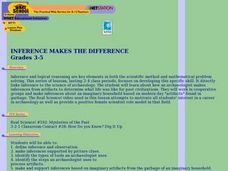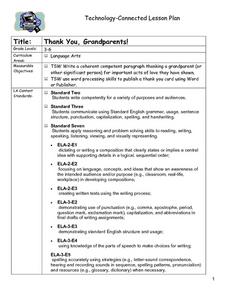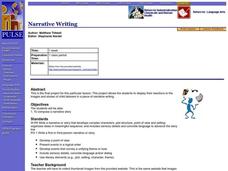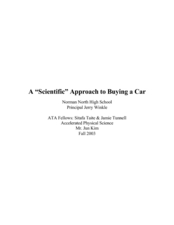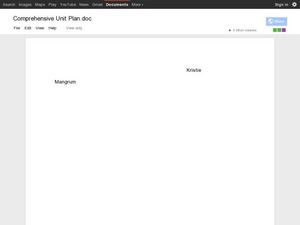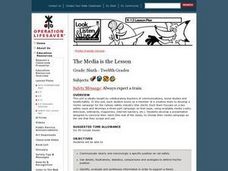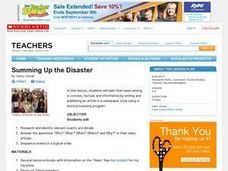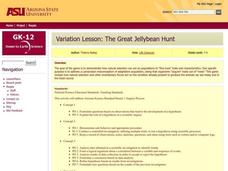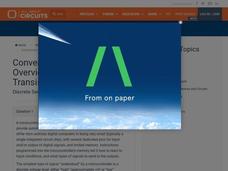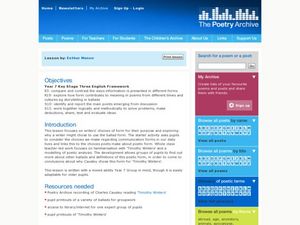Curated OER
Insects: Bugs, Science, Entomology
In this lesson, insects are explored through reading of children's literature, classifying insects versus non-insects, drawing and painting various insects, and learning how to clap to certain rhythms while reciting insect names.
Curated OER
Inference Makes the Difference
Students explore how archaeologists make inferences from artifacts to explore what life was like in the past. In this archaeology lesson, students work in groups and make inferences about an imaginary household based on modern day...
Curated OER
Current Events and Prices
High schoolers read a recent article about the likelihood of a decrease or increase in prices of a specific consumer good. Using the Internet, they examine current events and make predictions about their effect on the economy. They write...
Curated OER
Thank You, Grandparents!
Pupils share important moments with their grandparents. Individually, they write one paragraph thanking them for being in their lives or for a specific event they have been involved in. They also identify ways they act like their...
Curated OER
The Polar Express
Learners read The Polar Express.They prepare a painting on KidPix that shows what they predict The Polar Express will be about. They show their paintings and tell what they feel the story is about and discuss why it is important to...
Curated OER
Mapping Personal Narratives
Second graders write a personal narrative using webs they created and a story map worksheet. In this personal narrative lesson plan, 2nd graders make lists of ideas to write about and pick one to focus on.
Curated OER
Graphing Pendulum Results
Sixth graders set up a pendulum experiment deciding which variable to manipulate (length of string or weight on the string). They create a hypothesis, collect necessary equipment, and write out each step of their experiment. They then...
Curated OER
Narrative Writing
Imagine a day in the life of a child who has to work 12-14 hours a day, seven days a week. After viewing images and reading stories of child laborers, class members select an image and write a richly detailed narrative about a typical...
Curated OER
Numeration Systems
In this physics worksheet, students complete 19 questions on binary numeration system. They explain how this system is used to operate computers.
Curated OER
Time Marches On
Students discover the times of Colonial America by creating a timeline. In this U.S. History instructional activity, students research a teacher-directed website about African Americans in early colonial times. Students utilize their...
Curated OER
A “Scientific” Approach to Buying a Car
Students examine what it takes to purchase a car and the resources out there to help find what you are looking for. In this scientific method instructional activity students complete different problem solving situations.
Curated OER
Paul Revere's Ride
Third graders read and discuss the selection "Paul Revere's Ride" (included with the lesson). Students imagine they live in one of the villages that Paul Revere stopped. They are awakened by his knock on the door. Students write an essay...
Curated OER
The Life Cycle of the Mealworm
Fourth graders provide a habitat for live mealworms and observe their life cycle. In this animal life cycle and scientific inquiry lesson plan, 4th graders create a habitat for a live mealworm and observe and record related data as it...
Curated OER
The Media is the Lesson
Students work as a member of a creative team and develop a media campaign for a client.
Curated OER
Summing the Disaster
Students assume the role of a newspaper editor during the time of the Titanic disaster. They must search out the accurate answers to the questions: What? When? Where? Who? and Why? students then write their own newspaper article...
Curated OER
The Great Jellybean Hunt
Students explore natural selection and its influence on the populations to fine tune traits and characteristics. The acquisition of traits developed out of need is examined through a game played in class.
Curated OER
Patriotic Songs
First graders recognize patriotic songs of America. In this historical music lesson, 1st graders discuss the historical background of the song "Yankee Doodle" and repeat the lyrics after the instructor. Students read the lyrics to the...
Curated OER
Conventional Transistor Overview and Special Transistors
In this electrical circuit worksheet, students develop an understanding of micro-controllers and then answer a series of 13 open-ended questions about transistors that include analyzing schematics. This worksheet is printable and the...
Curated OER
Ballads and Communication
Learners compare and contrast different forms of communication. In this poetry lesson, students focus on the ballad form and read "Timothy Winters". Learners draw conclusions from the ballad and divide into groups to research the...
Curated OER
To Present And Give Controlled Practice of 'could I + Inf' And 'could You + Inf' As Polite Requests
Students practice 'Could I + inf' and 'Could you + inf' as polite requests.
Curated OER
Apply Technological Design and Scientific Habits of Mind
Students are introduced to the principles involved with technological design. In groups, they use the Internet to research an important historical innovation and how it changed the world. They discover the barriers that were involved in...
Curated OER
Rolling Marbles
Pupils develop and use problem solving strategies to mathematically solve a word problem involving marbles. They solve the first part of the problem together as a class, and in small groups solve and write a solution for the problem...
Curated OER
Holidays in Kansas
Students identify holidays celebrated by different cultures in Kansas and create a timeline of when they started to be celebrated. In this Kansas holidays lesson plan, students create a timeline wall in their class for each holiday.
Pennsylvania Department of Education
6 Traits: Voice
Young scholars explore the trait of voice. In this language arts lesson, students focus on the writing trait of voice. Young scholars view a video and practice writing.



